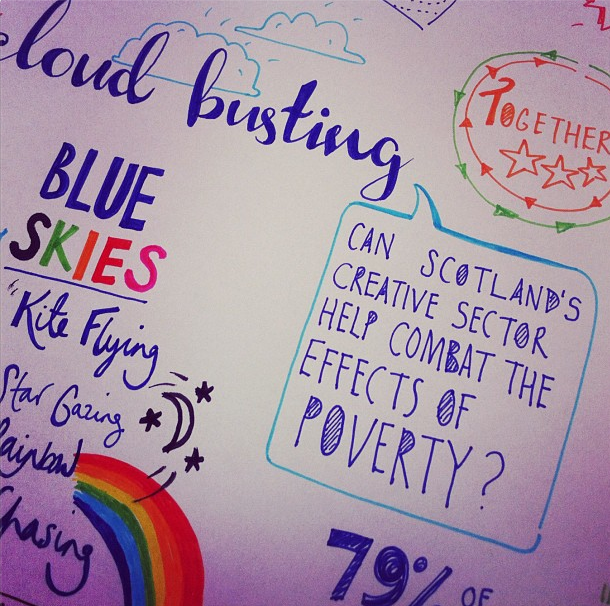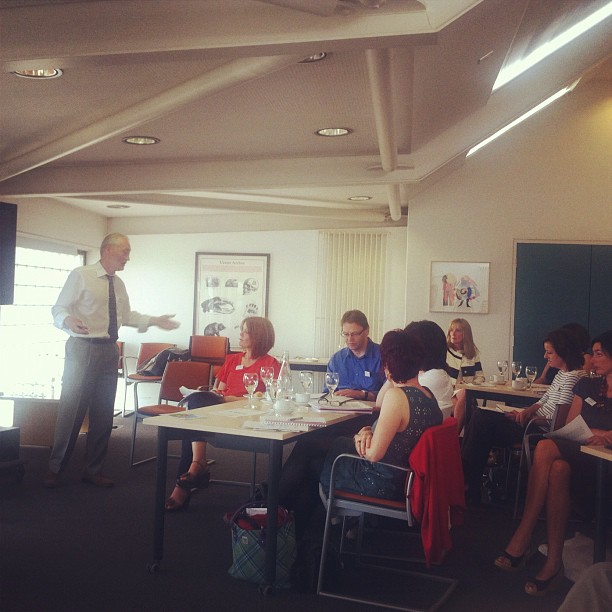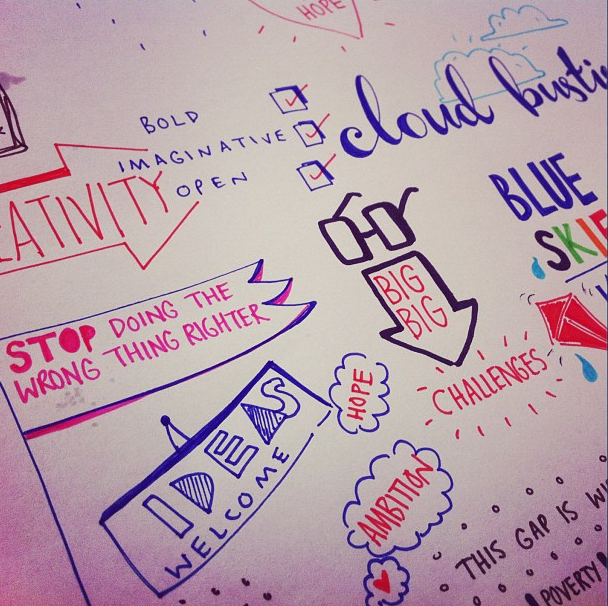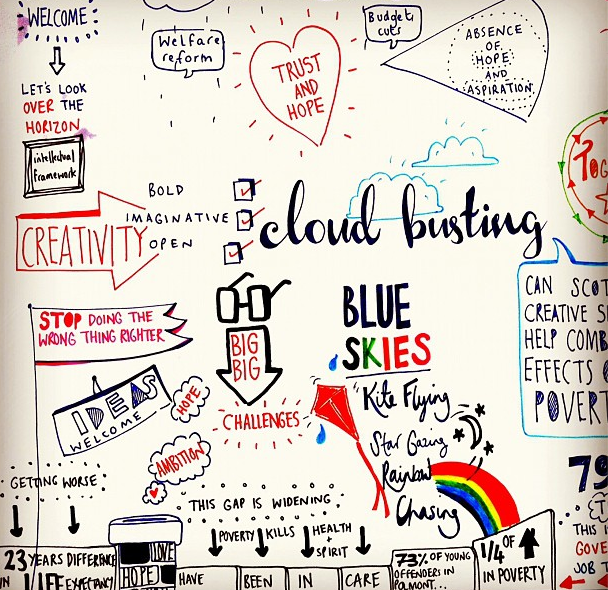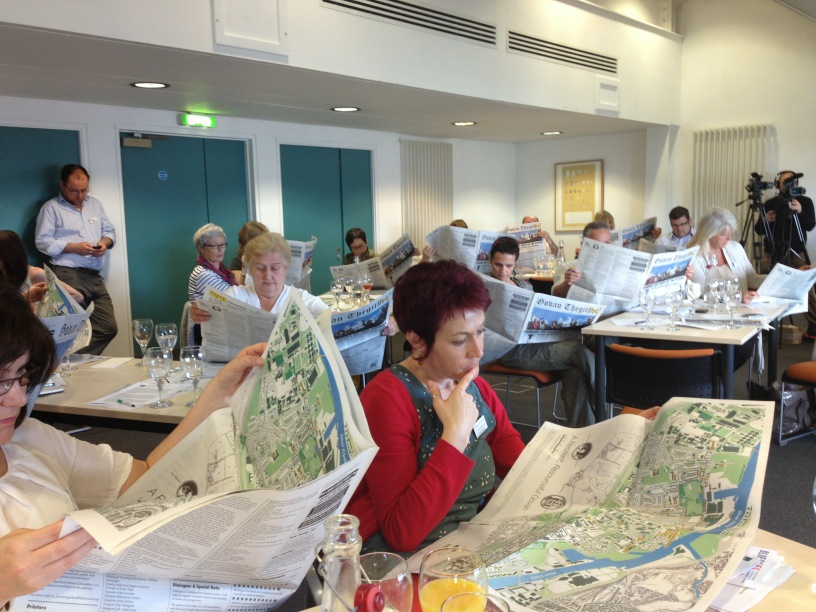Cloudbusting, Kite Flying and Star gazing
Dundee is a magnificent city that faces extraordinary challenges and last week I spent a day talking and thinking about how the creative and cultural sector can help tackle those challenges. Cloudbusting is the first in a series of national gatherings led by the creative producers, Big Sky, which seeks to answer big societal questions. This time it was part of the DCA's Blue Skies weekend. The room was made up of the private, public and third sector - businessmen, entreprenuers, artists and chief execs. This mix is not an easy one to bring together so well done Bryan Beattie!
The day launched with businessmen Ellis Watson, the CEO of the regional newspaper publisher DC Thomson, former Mirror Group boss and chief executive of Simon Cowell's entertainment company Syco. Ellis set the scene of the day by talking about looking over horizons so we can build an intellectual framework to combat poverty in Dundee. It was refreshing and almost relieving to hear someone from Ellis's background talk passionately about why the cultural and creative sector is fundamental to the days conversation.
In this case statistics are important but they do require context and balance so I'll just list a few to help you understand the reality of what Dundee faces: in different parts of the city, areas that are just a stones throw away from each other have a difference in life expectancy of 23 years. In Dundee the absurd juxtaposition between poverty and affluence is brought into sharper focus because of the small size of the city. In Polmont young offenders institute, 73% of the young men were previously in the care system.
One more statistic for you and remember this one as you drive through dundee and see all the water front developments, and read the newspaper about the big plans for the V and A museum ... remember that currently over one quarter of households in Dundee live in poverty.
I've worked in Dundee, I lived there for five years and compared to other places I have lived and worked there is at times an absence of hope in the city. Aspiration is being bred out of people and where are the role models?
Admittedly, there are great initiatives happening throughout the city and lots of people working very hard and doing an incredible job but the net outcomes suggest it's not working. Poverty pervading in spite of amazing efforts suggests either a lack of clear strategy or a lack of implementation of that strategy. There can be no other reason for amazing effort and hard work not producing better results.
Jenny Marra, Labour Member of the Scottish Parliament for North East Scotland and Shadow Minister for Community Safety and Legal Affairs, bravely admitted that all political parties are struggling with answers and ideas. This is not because of a lack of focus or a want to make things better but the stark reality that throwing money at services alone is not enough. Politicians are famously good that identifying the issues but now it's not even answers but ideas they need the most.
Jenny is working to change the labour party conference so you are not allowed to approach the podium unless you have an idea to offer because so many of the speeches identify the problems - we all know what the problems are - it's seeking solutions that will start to change our city and change our country.
Admirably, Jenny embraced her political stance and voiced the elephant in the room - the budget implications in all of this. However, the truth is that the most successful policy since Scottish Parliament opened 13 years ago is the smoking ban. It was a good, simple idea and it cost nothing. Unless politicians are able to be bold and imaginative lives in Scotland will not change.
So what does Kite Flying have to do with all this? The potential Scotland has and where it has come from in the last decade is phenomenal and there is so much excitement around what we could do as a country. Dundee plays a big part in this with the re-generation of the water front and V and A. Yet, Scotland is often termed as the sick man of Europe. However, if you took Dundee and Glasgow out of Scotland and stuck it out in the Atlantic the health outcomes of Scotland would be the same as the rest of Europe.
But what does poverty mean actually? GDP? Life expectancy? Slums in cambodia? How do we visualise poverty? Nora's day job shows that poverty means you are much more likely to get cancer and if you are poor you are much more likely to die of cancer even if you get diagnosed at the same stage and go through the same pathway as a wealthier person. But this is not about a disease phenomem it is about a whole host of social and cultural issues. Poverty kills. It kills life, it kills health and it kills spirit.
So how do we move to star gazing? All the evidence would suggest that we have to look at things differently and seek more creative ways of doing things. There are already great plans in place such as the Dundee Partnership Fairness Strategy. Things like this are key drivers for change in the future because this has to be tackled collectively. It is not the responsibility of one sector or one individual or organisation. This requires long term collaboration on a big scale. Undoubtedly, this will take at least two generations to shift. This requires significant and prolonged effort - not short term solutions.
And what about rainbow chasing? Nora believes the pot of gold does exist at the end of the rainbow in Dundee. The arts, music, sport and the cultural history that Dundee have must be harnessed. Dundee has got a fantastic heritage and we should build on that. How do we harness the creative power of the city and make it meaningful? How does Dennis The Menace influence the Fairness Strategy? The opportunities are enormous and the challenges are great but working collaboratively we can really make a difference.
Andy Milne, the CEO of SURF talked about the 'creatification of everyone' stating the giving workers the creativity and autonomy to do things differently should be the focus of Government .
We watched a short video from the Chief Medical Officer of Scotland, Dr Harry Burns who talked about the biology associated with being poor and he reminded us all that it never says cause of death: poor housing or cause of death: poor on any birth certificate.
Chris van der Kuyl, the CEO of Bright Solid talked honestly and openly about the public sector fixation on controlling everything and reminded the audience that days of IT teams being in control are coming to a sharp and swift end.
"If you think someone in Silicon Valley is going to come up with the tech that will solve the problems in Dundee you are wrong. The solutions have to come from here - from us - from Dundee's people"
Artist, Jacqueline Donachie brought waves of raw emotion into the room by sharing her families battle with Muscular Dystrophy. She believes we deserve beauty in all areas of life. Why isn't the doctors surgery as nice as a hair salon? I believe the same 'levels of service' are deserved in in all areas of life. Why does dining in my local restaurant make me smile and always deliver yet the national health service make me feel stupid and fail to understand my needs?
One shocking thing Jacqueline told us was that she met with a group of world class academics who have been researching the disease for twenty years but (and this beggars belief!) had never, once, ever met someone with Muscular Dystrophy.
Liz from Fablevision introduced us to their work to bring communities together through Govan Thegither. Alan Lyddiard talked about his previous projects with the homeless and challenged the audience to think about what would happen if the homeless could curate an exhibition at the V and A and think about the people outside the room who don't agree with us. Peter Kelly from the Poverty Alliance asked who's poverty is it anyway? One problem is how middle class people perceive the problem in the first place.
- 38% of people think poverty is an inevitable part of modern society
- 19% structural injustice
- 28% think it's laziness and lack of will power
- 79% of people think poverty is governments job
How can we tackle this?
- Real life stories delivered by real people
- Practical alternatives to current approaches
- Realise poverty and inequality are equal ( this has implications for how we talk about the wider system )
There are two key documents from Government out there The Community Led Regeneration and the Community Empowerment Renewal Bill ( will come out at the end of September and is currently being consulted on ) But as Nora rightly asks "Why do we need a bill so we can talk to each other?"
We must debunk this myth of scarcity. The money is there - it's a question of where we put it. Of course Cloudbusting was full of 'haves' - what are we all personally going to give up for the 'have nots'? If you are preaching equality - how do you preach it in your daily life? Do you go to the shops and use the churches and play parks in the deprived areas near you? What would happen if we all did that....
And yes all of what I heard at Cloudbusting made sense but the reality is that currently systems stop us acting upon fresh ideas. This is our focus at Snook - how to work inside the systems and find solutions from a stance of humility, with no agenda and no pre determined answers. Our focus in on helping people to articulate their own solutions.
As journalist Lesley Riddoch says "We need to stop trying to do the wrong things righter" because this is too big to ignore but small enough to tackle. The most important and vital tool we have is the attitude and desire to re-think things so we can make an even more profound difference. Projects and processes with limited outcomes are perhaps just the wrong things to be doing and we need to say this confidently. We must be confident to think wide, deep and look far and be unashamedly and ludicrously ambitious for our future. We need to be bold.
